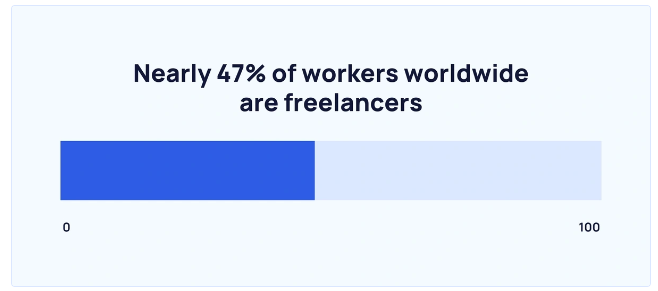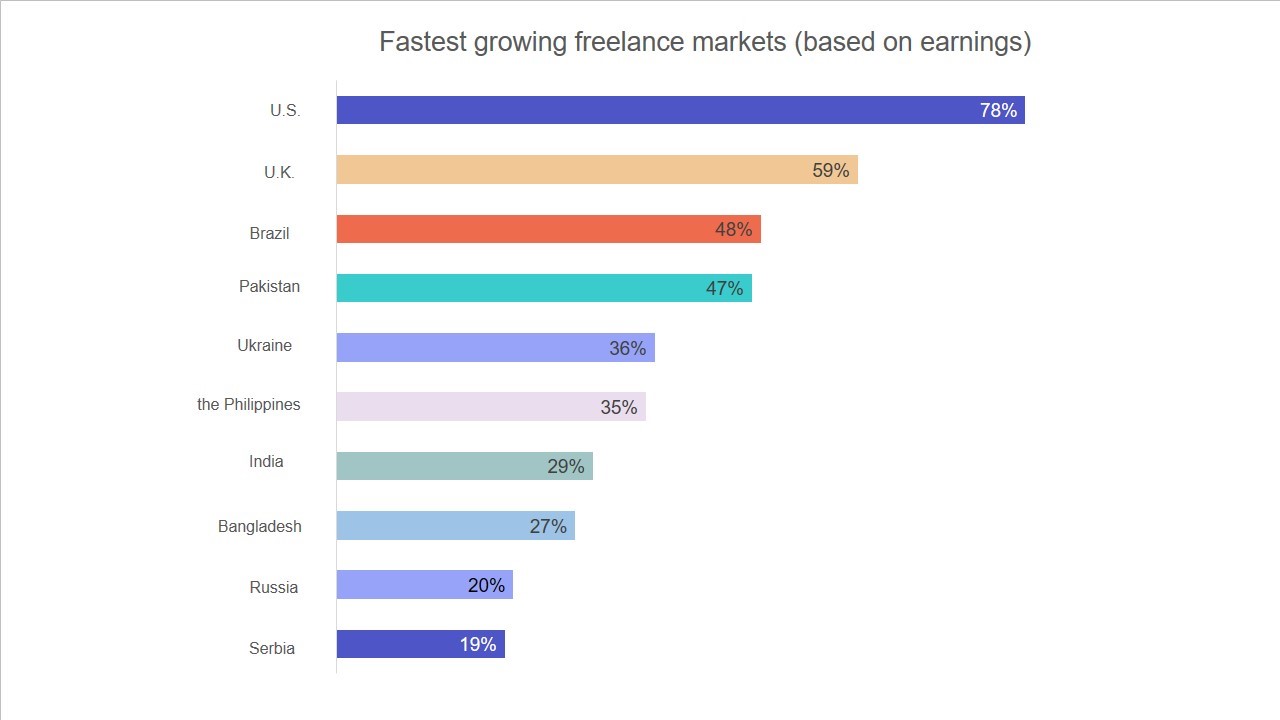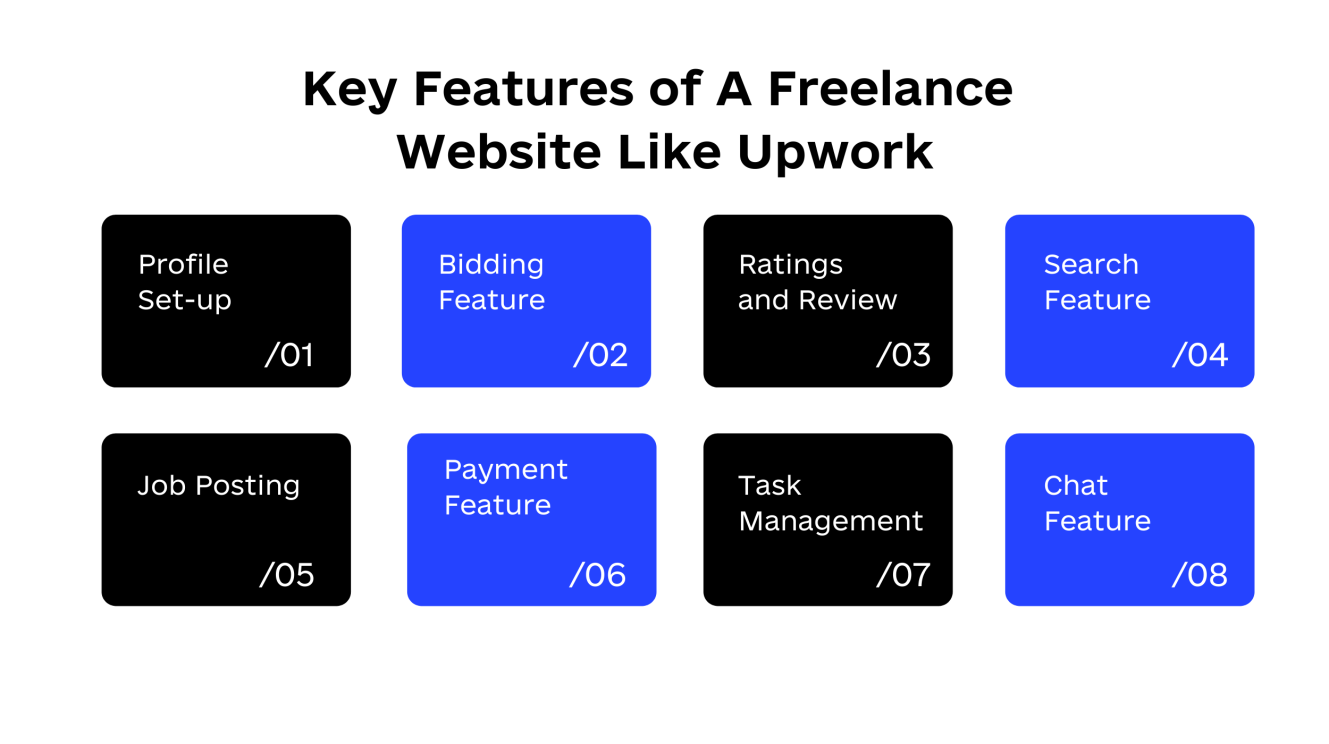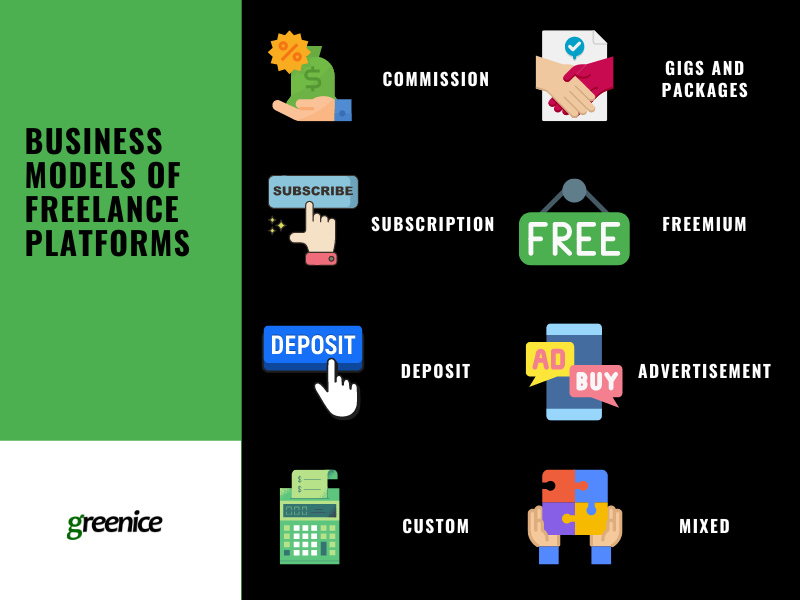
How to Build a Freelancer Marketplace? – A Comprehensive Guide
“Solopreneurs will rise because freelancers will become commodities to utilize.” ― Richie Norton
Table of Contents
- What is a Freelancing Marketplace?
- Freelancer Marketplace Stats – Important Numbers
- How do Freelancer Marketplaces like Upwork Work?
- Revenue of Freelancer Marketplace Upwork – Year-by-Year
- Top 5 Features of a Freelancer Marketplace
- Advance Features of a Freelancer Platform
- Types of Freelancing Marketplaces
- Business Model of Freelancer marketplaces like Upwork
- How to Build a Freelancer Marketplace? – Step-by-Step Guide
- Top Web Development Companies to Build a Freelancer Marketplace
- How much does it Cost to Build a Freelancer Marketplace like Upwork?
- Conclusion
- Frequently Asked Questions – Build A Freelancer Marketplace
- How Does Upwork Work?
- What Percentage Upwork does Take?
- What are some top features of Upwork Alternatives?
- How Much Time Will Take To Create a Freelancer Marketplace from Scratch?
The quote by bestselling author and serial entrepreneur, Richie Norton, perfectly describes the reason for massive popularity of freelancing marketplaces nowadays.
People prefer to choose to freelance over conventional working models due to the flexibility and work-life balance it offers.
Notably, employers are also leveraging the model and hiring freelancers when required to get the work done. For reference, one of the tech giants, Google’s, workforce constitutes 54% freelancers over only 46% full-time employees.
Therefore, developing a similar marketplace can be a profitable solution to match the existing demand. Now the next question…! How to build a freelancer marketplace? Read the complete article thoroughly to know.

What is a Freelancing Marketplace?
A freelancing marketplace is a platform to connect employers and individual specialists for long-term & short-term projects without any commitment to employment. The platform acts as an intermediary between the parties and ensures work quality, payment, and convenience for the tasks assigned. Some popular freelancing sites are Upwork, Fiverr, Toptal, Freelancer.com, and 99designs.com.
Freelancer Marketplace Stats – Important Numbers
- More than 1.57 billion people out of the global workforce do freelancing
- Approximately 70% of freelancers are less than 35 years old.
- The average freelancer earns $21/hour
- The freelancing market is valued at more than $3.39 billion now.
- Upwork’s revenue has also increased by 4 times from 2016 to 2022, crossing the $600M per annum mark.
- Google has more freelancers hired than full-time employees.

Image Source: explodingtopics.com
How do Freelancer Marketplaces like Upwork Work?
Freelancing marketplaces are intermediaries between a client and an individual looking for work. Generally, it starts with a client posting a requirement or a project to be done with the required details and waits for the candidates to apply. Once posted, candidates apply for the job, with a quote and the time required for getting the project done, along with his/her profile.
For freelancers, their task is to find relevant jobs, apply to them, and, once assigned, complete them within the set time. To grow or rank higher in the marketplace, freelancers need to get good reviews, improve their skills, experience, and do well on projects.
Revenue of Freelancer Marketplace Upwork – Year-by-Year
| Year | Revenue |
| 2016 | $164 Million |
| 2017 | $203 Million |
| 2018 | $253 Million |
| 2019 | $301 Million |
| 2020 | $374 Million |
| 2021 | $503 Million |
| 2022 | $618 Million |
Top 5 Features of a Freelancer Marketplace
1. Registration: A freelancing platform must have a user-friendly profile creation or registration button for all the parties involved, i.e., freelancers, clients, and agencies. A good option is to give social media log-in button for fast & easy execution. One can collect crucial information like past experience, skills, portfolio, and photos on this step only or can also simultaneously give a skip button. To avoid scams and fake profile creation, verify the identity of the freelancer & recruiters through a valid ID.
2. Job Listing: It is one of the core features of a freelancer marketplace and allows recruiters to post assignments and jobs for freelancers. You can mention the length of the project, the skills required in a freelancer, the gist of the task, and describe the company/project in this section.
3. Review & Rating: Another core feature of an app like Upwork is its review & rating system. Recruiters and freelancers both have the option to rate each other and share their experiences on the platform. This helps in getting future projects & building trust and authority over others. Notably, it is wise to keep the features open for parties involved in the project only to avoid spam or reviews from unknown sources.
4. Secure Payment System: A smooth and secure payment system is essential for any freelancing marketplace to run. A good freelancer marketplace has multiple payment options like debit/credit cards, Net Banking, IMPS, PayPal, etc.
5. Advance Search Options: A freelancer marketplace app like Upwork provides advanced search & filter options to freelancers and clients. Freelancers have the option to filter their results as per budget, location, keyword, and specific skills; and can also sort the results by time, project size, project cost, or recommended as per past data.
Advance Features of a Freelancer Platform
1. Time Tracking Tool: You can add a time tracking or project management tool and create transparency among clients & freelancers on tasks assigned. A time-logging feature is the perfect solution to keep track of hourly tasks.
2. Communication Tools: Existing freelancing platforms do have communication tools for freelancers and recruiters, but they come with limited features and are difficult to use. Adding a user-friendly tool that lets both parties share files, share screens, text each other, and do video/voice calls for better understanding.
3. Translation: Another good feature to add to your freelancer marketplace is the live translation on the chat feature. This will allow non-English speakers to access the platform also and will be easy to use for a mass population.
4. Dispute Resolution Button: Freelancing is an agreement between two parties, and conflict in the agreement is common. Many freelancers complain of not being paid, while many recruiters also have complaints about receiving the quality of work they were expecting. A dispute resolution button on the chat/project management dashboard will help resolve issues faster for both parties.
5. AI/ML Match: Existing freelancing platforms work on already set algorithms to match freelancers and recruiters. However, these algorithms are complex and match unqualified candidates also. One can offer a better version using AI/ML technology by understanding clients’ requirements; analyze their search queries, past behavior, and past preferences. AI can also take into consideration the freelancers’ hourly rate, time zone, reviews, and portfolios to match them with the right recruiters.
Fact: One of the leading freelancing platforms, Upwork, has over 10 million active freelancers and 1 million active clients.

Image Source: code-care.com
Types of Freelancing Marketplaces
1. Global Marketplace: Global freelancing marketplaces work over and above a particular area, and freelancers from around the world can join the platform. Some top examples of global marketplaces are Fiverr, Upwork, and Behance.
2. Local Marketplace: Many freelancing sites only work for a particular city or country and don’t serve people outside that area. One prime example is Salita, which works for translators in Norway only.
3. Niche Marketplace: Many sites focus solely on a particular niche and help people find specialists in a particular field. This type of marketplace helps build a community of experts from the same industry who can learn from each other’s projects, take inspiration, or learn trends. Some prime examples of this type are 99designs for designers and Toptal for IT professionals.
4. General Marketplace: If you want to build a freelancer marketplace open for people from different professions & skills, then consider a general marketplace. For example, freelancer.com and Fiverr are general marketplaces and are open to everyone.
5. Long-Term Projects Platforms: Apps like Upwork are the freelancing platforms that focus more on long-term, large assignments with a good budget size. These are the most versatile sites, i.e., they carry a variety of job types and different payment types.
6. Short-Term Projects Platforms: Apps like Fiverr are short-term project platforms focusing on specific small tasks such as content writing, copywriting, designing, or video editing. These sites are designed for low-budget clients focusing more on employers through affordable price freelancers.
Fun Fact: The top 30% freelancers make more than $75000/year.
Business Model of Freelancer marketplaces like Upwork

1. Flat Fee: One can charge a flat fee or a fixed percentage on each transaction, as freelancing platforms like Upwork does. Fees can be charged from both parties, i.e., the buyer and the seller, on completing the task/project. Notably, this is one of the most popular revenue-earning models for these platforms.
2. Sponsored Listings: Another popular monetization strategy is charging freelancers or recruiters to appear their listings on top. Everyone wants their post to be on the top and is ready to pay for it.
3. Initial Deposit: You can mandate an initial deposit for recruiters or freelancers, fully or partially refundable. Websites like Toptal use this model and charge a $500 deposit from all the recruiters to get started, but it is fully refundable at the time of account closing.
4. Freemium: This model is also quite popular among platforms and allows the user to navigate through the app’s core features for free. However, the platform charges for the additional/premium features, which facilitate some advantages over free users. Freelancing platforms Upwork & Freelancer.com have a free as well as a premium model for users.
5. Subscription Model: This strategy charges a fixed subscription fee in exchange for the service. For example, Upwork also has a subscription model for corporate and agency accounts, which starts from $49.99/month and goes up to $999 per month.
6. Combination Model: You can also use a combination of monetization strategies for your platform, as most freelancing sites do. For example, you can charge subscriptions from corporate/recruiters and can offer a Freemium model to freelancers to boost your revenue.
Fact: More than 70 million Americans are freelancing currently, and the number is expected to grow to 90 million by 2028 for the USA alone.
How to Build a Freelancer Marketplace? – Step-by-Step Guide
1. Research: First thing before you start to build a freelancer marketplace is to do your research correctly. Study competitors & understand the audience, market, and business model properly. There is already a lot of competition in the freelancing market, and to make your website stand out, find & correct your competitors’ omissions. Make sure to have your target audience set in mind and give them strong reasons to join a new platform. For example, websites like Toptal only target IT professionals and have their audience set.
2. Select a Business Model: the next step is to prepare revenue earning strategy for the platform. You have several options to choose from, like Freemium, subscription, flat fee, or a combination strategy. Selecting a business model in advance is significant because it influences your audience, customer journey, and the platform’s interface.
3. List the Functionalities: The next step is to determine the required functionalities of your freelancer marketplace. Identify all the core & additional features you will be offering to your users over your competitors to stand out. You might not need to prepare a detailed description of the features, but listing them down is crucial. Notably, it is important to have some additional features over competitors to attract customers.
4. Hire a Team: once you’re done with all the research and identified all the functionalities, it is time to get your platform developed. If you don’t have a team of developers already, you need to get it done either using a ready-made template (available on WordPress or other CMSs) or hiring web developers. Both options have their pros, such as using a template is cost-efficient, while hiring top web development companies will get you a platform with additional features.
5. Website Design: Once you have hired a team for your project, it is time to get your front end developed. It is the design of the platform and has a great influence on user conversion and retention. The UI/UX of the site is developed generally using React.js and includes stages like analysis, wireframing, design, etc.
6. Backend Development: The next step for developers is to start coding and prepare the backend of the site. This also includes developing all the functionalities for your site. The site can be developed using many programming languages, but the recommended ones are Grape & Rails API for developing storefronts for the market, PostgreSQL for database management, AWS for cloud, and Redis serves as a message, database, and cache broker.
7. Testing & Deployment: Once the design and the backend coding are done, it is time to get the website tested. Testing is essential to ensure smooth site navigation and find bugs to fix. The next step will be to buy the domain & hosting and deploy the site for launch.
8. Launch & Maintenance: The last step is to launch the site for the general public to use. It is essential to take feedback from the users frequently to keep the site updated for them.
| Platform | Total Visitors/Month | Started | Funding | User Satisfaction |
| Upwork | 61 Million | 1999 | $168.8 Million | 98% |
| Fiverr | 35 Million | 2010 | $111 Million | 98% |
| Freelancer.com | 7 Million | 2009 | AU$37.5 M | 97% |
Top Web Development Companies to Build a Freelancer Marketplace
Konstant Infosolutions
Konstant Infosolutions is a top web & mobile app development company offering its services to global clients for 20+ years now. The company has a massive team of 200+ experience developers and is a top-rated firm on many research sites, such as Clutch, GoodFirms, Business of Apps, ITfirms, and many more.
Magneto IT Solutions
Started in 2009, Magneto IT Solutions is another top software development company that offers services like website design, development, eCommerce, and support & maintenance. The company employs over 80+ professionals and has offices in India, the USA, and Bahrain.
Django Stars
Established in 2002, Armada Labs has been delivering global technological and development services to clients. The company has expertise in Fintech startups and has over 220+ FTE fintech experts on the team. The company has two offices, one in Poland and another in the USA, with top clients like Koalafi, QuickFee, Till Payments, etc.
How much does it Cost to Build a Freelancer Marketplace like Upwork?
The cost to build a freelancer marketplace depends upon several factors, including the platform complexity, business model, Development Company you choose, and many more. Out of all the factors, features and the development company play a significant role and will cover a major part of the cost. Just for reference, developers in US/UK charge $100-$200/hour, while top mobile app development companies in India charge $20-50/hour for the same work. Considering all the factors, the cost to build a freelancer marketplace will cost you approximately $70,000-$90,000.
Interesting Note: Graphic designing, computer programming, and web designing are the most paying freelance jobs.
Conclusion
So, this was the comprehensive guide to build a freelancer marketplace like Upwork. Note that the development of a freelancing marketplace requires some serious work and additional unique features over existing players to make a place in the market. It requires market research, industry knowledge, UI/UX designing, coding, and choosing a suitable business model. If you are not an expert in it, then consider some top web development companies to seek professional help from them.
Frequently Asked Questions – Build A Freelancer Marketplace
How Does Upwork Work?
Upwork is a freelancing platform that facilitates employers or clients to outsource their work to individual experts. A client posts a project and receives a number of applications from freelancers, giving him the choice of hiring a good candidate at an affordable cost.
What Percentage Upwork does Take?
Upwork charges a flat 10% fee from freelancers on each project and 5% from clients if the project is worth less than $500.
What are some top features of Upwork Alternatives?
Some top features for a freelancer marketplace like Upwork are registration, a bidding system, an advanced search & filter option, communication tools, and project management tools.
How Much Time Will Take To Create a Freelancer Marketplace from Scratch?
It is a complex task to build a freelancer marketplace and requires a lot of time. The exact time can’t be determined without knowing the complexity and features required, but it takes approximately 1600-3000 hours (depending upon the app) to develop an app like Upwork.
